Software engineers are the architects and builders of the digital world. They design, develop, and maintain software systems that power everything from small applications to large-scale platforms.
Software engineering skills encompass a wide range of technical abilities, including proficiency in programming languages, understanding of algorithms and data structures, and knowledge of software development methodologies. Additionally, skills like analytical thinking and teamwork are also important.
Candidates can write these abilities in their resumes, but you can’t verify them without on-the-job Software Engineer skill tests.
In this post, we will explore 9 essential Software Engineer skills, 10 secondary skills and how to assess them so you can make informed hiring decisions.
Table of contents
9 fundamental Software Engineer skills and traits
The best skills for Software Engineers include Programming Proficiency, Algorithm Design, System Architecture, Debugging Skills, Version Control, Database Management, API Integration, Security Practices and Testing Procedures.
Let’s dive into the details by examining the 9 essential skills of a Software Engineer.
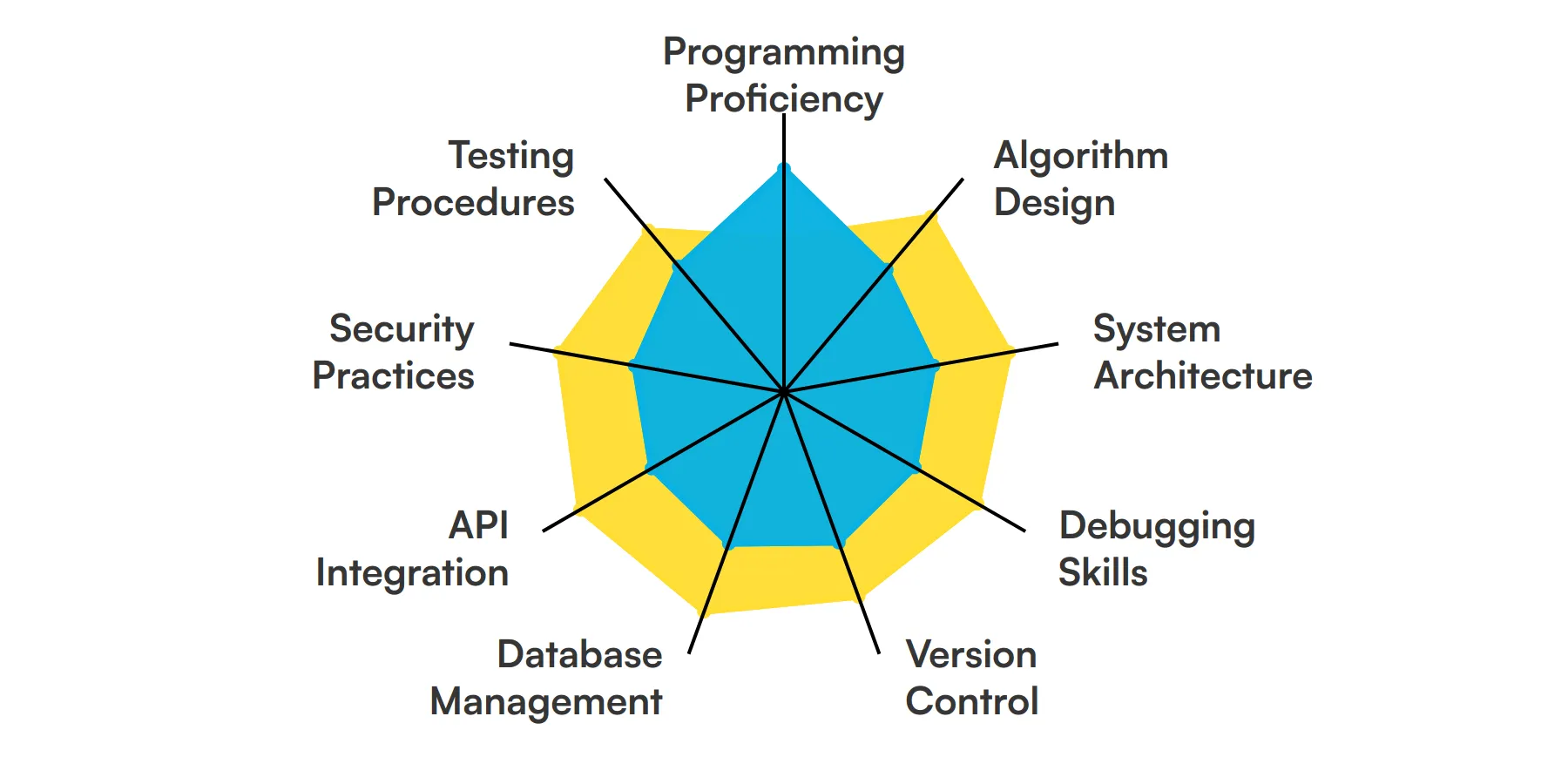
Programming Proficiency
Software engineers must be adept in multiple programming languages such as Java, Python, or C++. This skill is fundamental as it enables the creation, testing, and maintenance of software applications that meet client or project requirements.
For more insights, check out our guide to writing a Software Engineer Job Description.
Algorithm Design
Understanding and implementing efficient algorithms is key for software engineers to solve complex problems and optimize software performance. This skill involves analyzing data structures and designing solutions that are both scalable and efficient.
System Architecture
Knowledge of system architecture allows software engineers to effectively plan and design the structure of software systems. This includes making decisions about code modularity, components integration, and data flow which are critical for building reliable systems.
Check out our guide for a comprehensive list of interview questions.
Debugging Skills
Debugging is an everyday task in the software engineer's role, requiring a methodical approach to identify and fix bugs. This skill ensures that software operates smoothly and meets quality standards before it reaches end-users.
Version Control
Familiarity with version control systems like Git is necessary for managing changes to the project codebase. This skill helps software engineers collaborate with others, track revisions, and revert to previous versions if needed, ensuring continuity in development.
For more insights, check out our guide to writing a Devops Engineer Job Description.
Database Management
Software engineers need to design, implement, and manage databases. Whether it’s SQL or NoSQL, understanding database technologies is crucial for storing, retrieving, and manipulating data efficiently within applications.
API Integration
Integrating and managing APIs allows software engineers to connect and interact with other software applications or third-party services. This skill is essential for enhancing the functionality of the applications they develop.
Check out our guide for a comprehensive list of interview questions.
Security Practices
Implementing security measures is critical to protect software from threats. Software engineers must incorporate secure coding practices and understand cybersecurity principles to safeguard user data and prevent unauthorized access.
Testing Procedures
Proficiency in testing methodologies such as unit testing, integration testing, and system testing ensures that software engineers deliver products that are reliable and meet user expectations. This skill is crucial for identifying and addressing defects early in the development cycle.
For more insights, check out our guide to writing a Quality Assurance (QA) Engineer Job Description.
10 secondary Software Engineer skills and traits
The best skills for Software Engineers include Cloud Platforms, Continuous Integration, Agile Methodologies, UI/UX Design, Performance Tuning, Scripting, Networking Basics, Documentation, Problem Solving and Project Management.
Let’s dive into the details by examining the 10 secondary skills of a Software Engineer.
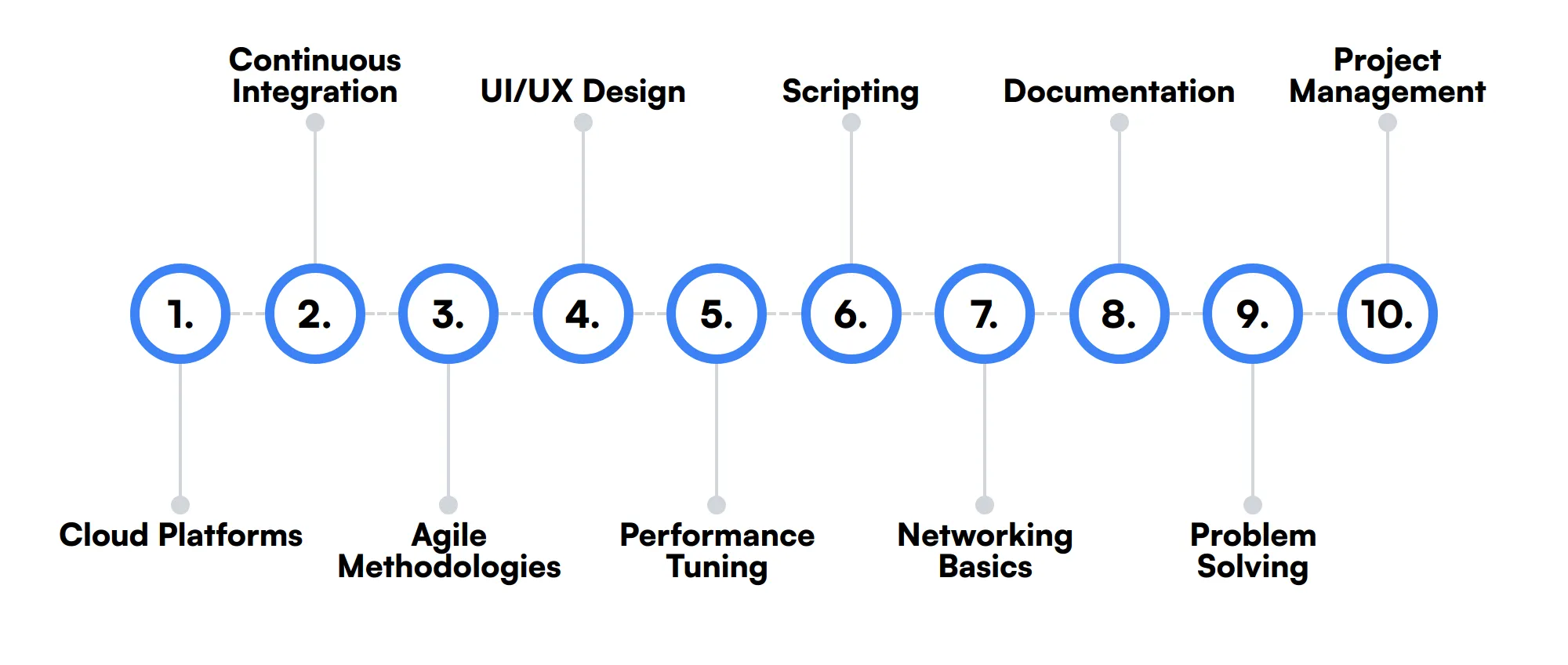
Cloud Platforms
Knowledge of cloud services like AWS, Azure, or Google Cloud is beneficial for deploying and managing applications on scalable, reliable infrastructure.
Continuous Integration
Experience with CI/CD pipelines helps software engineers automate testing and deployment processes, increasing development speed and reducing human error.
Agile Methodologies
Understanding Agile practices is important for software engineers to adapt to changing requirements and improve collaboration with team members.
UI/UX Design
While not always mandatory, having a grasp of user interface and user experience design can help software engineers create more user-friendly applications.
Performance Tuning
Skills in optimizing application performance can make a significant difference in how smoothly and efficiently software runs, enhancing user satisfaction.
Scripting
Scripting abilities in languages like Bash or Python allow software engineers to automate routine tasks, enhancing productivity and reducing errors.
Networking Basics
A basic understanding of networking can aid software engineers in troubleshooting and optimizing application connectivity and performance.
Documentation
Good documentation practices are necessary for maintaining clarity in code and processes, aiding both current projects and future maintenance work.
Problem Solving
The ability to quickly identify problems and think through solutions is beneficial for software engineers as they navigate complex project challenges.
Project Management
Skills in project management can help software engineers plan, execute, and monitor software development projects effectively.
How to assess Software Engineer skills and traits
Assessing the skills and traits of a Software Engineer goes beyond just glancing at their resume. While a resume might highlight their experiences and certifications, it doesn't provide a clear picture of their hands-on skills like Programming Proficiency, System Architecture, or Debugging Skills. To truly understand a candidate's capability, practical skill assessment is necessary.
In today's competitive tech environment, finding the right Software Engineer can be streamlined using targeted assessments. Tools like Adaface offer tailored assessments that evaluate a range of necessary skills from Algorithm Design to Security Practices and Testing Procedures. By integrating these assessments into your hiring process, you can achieve a 2x improvement in the quality of your hires. For more details on setting up a comprehensive skills assessment, visit Adaface assessments.
Moreover, using such precise testing tools helps in significantly reducing the time spent in screening candidates. With Adaface, companies have seen up to an 85% reduction in screening time, allowing them to focus more on engaging with potential hires who are proven to meet the job requirements effectively.
Let’s look at how to assess Software Engineer skills with these 5 talent assessments.
Computer Programmer Coding Aptitude Test
The Computer Programmer Coding Aptitude Test evaluates candidates on their ability to solve problems using logic, analytical thinking, and programming concepts. This test is designed to assess programming fundamentals, data structures, algorithm basics, technical aptitude, and coding skills.
The test uses scenario-based MCQs to evaluate understanding of algorithms, data structures, programming paradigms, syntax, and programming logic. It assesses the ability to analyze problems, identify patterns, and develop solutions using programming concepts. Candidates are also tested on their proficiency in writing functional code, regardless of the specific programming language or framework used.
Successful candidates demonstrate strong problem-solving skills and a solid grasp of programming fundamentals. They can effectively analyze scenarios and apply their knowledge to develop efficient solutions.
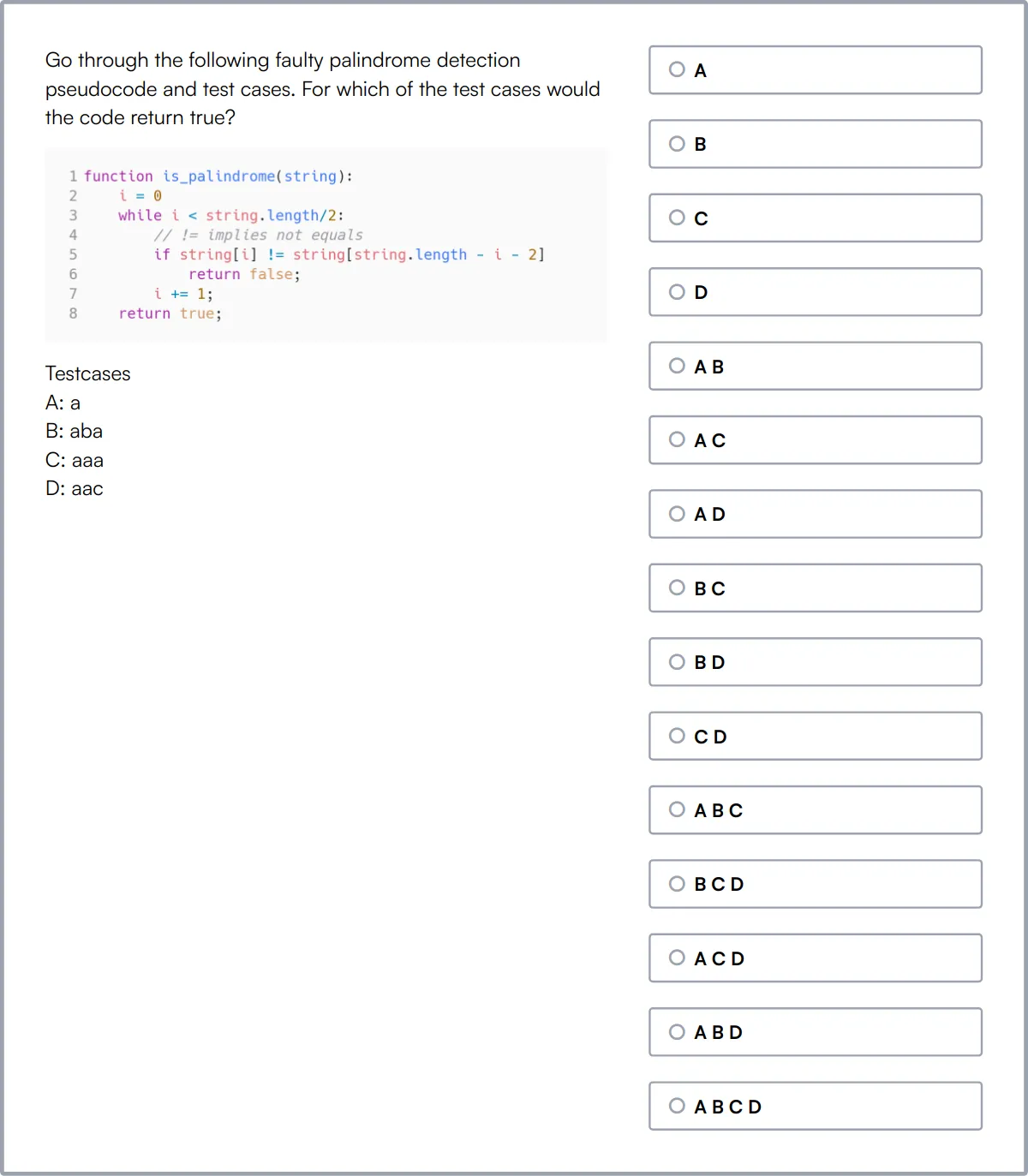
Software Engineering Online Test
The Software Engineering Online Test evaluates candidates on core computer science concepts such as object-oriented programming, database design, algorithms, data structures, testing, quality assurance, web development, software security, and code optimization.
This test uses scenario-based MCQs to assess understanding of data structures, algorithms, databases, programming paradigms, and design patterns. It includes a coding question to evaluate problem-solving and hands-on programming ability.
Candidates who perform well on this test show proficiency in core software engineering concepts and the ability to apply them in practical scenarios. They demonstrate strong coding skills and a solid understanding of software development principles.
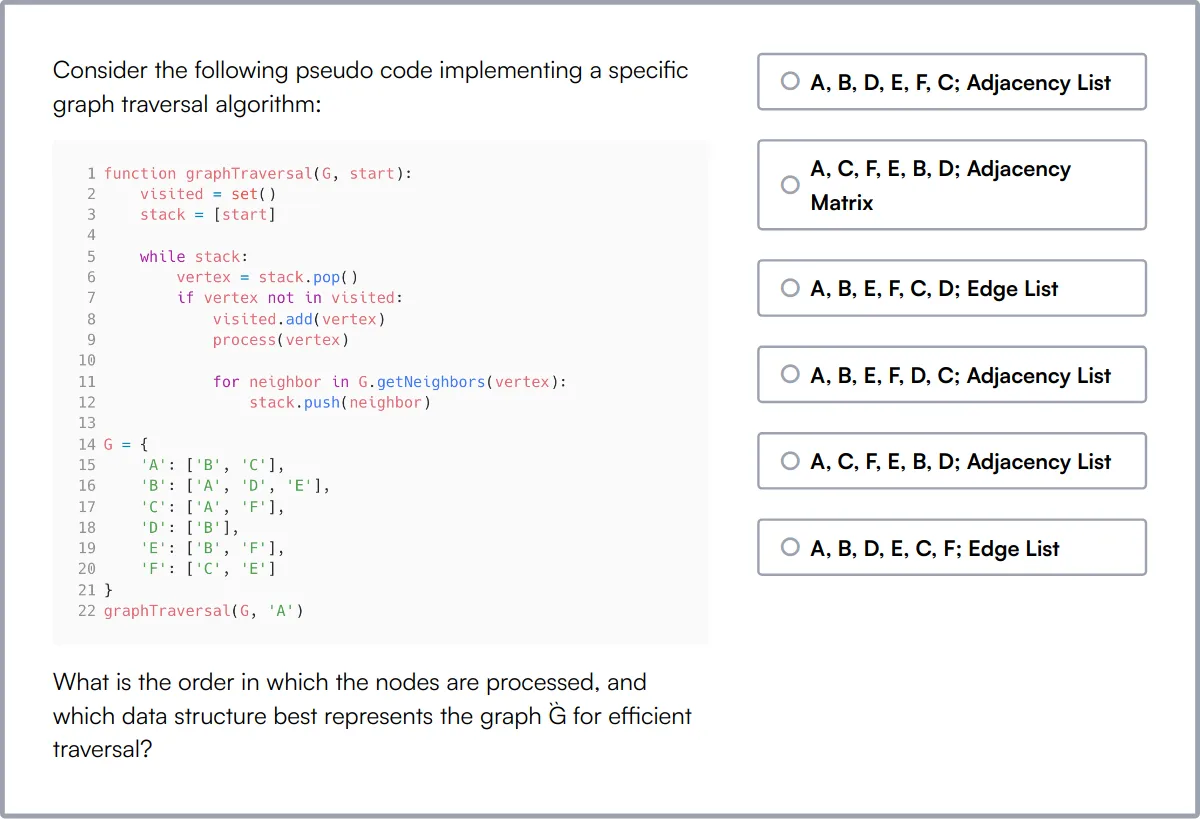
System Design Online Test
The System Design Online Test evaluates candidates on their proficiency in designing software systems that meet functional and non-functional requirements. This test covers system design, algorithms, data structures, network protocols, database design, distributed systems, cloud computing, performance optimization, and microservices architecture.
The test uses scenario-based MCQs to assess the ability to identify system requirements, choose appropriate architectures and design patterns, and create high-level design specifications. It focuses on database design, data modeling, system integration, security, performance optimization, and quality assurance.
Candidates who excel in this test demonstrate a strong understanding of system design principles and the ability to create scalable, efficient, and secure software systems. They show proficiency in various aspects of system architecture and design.
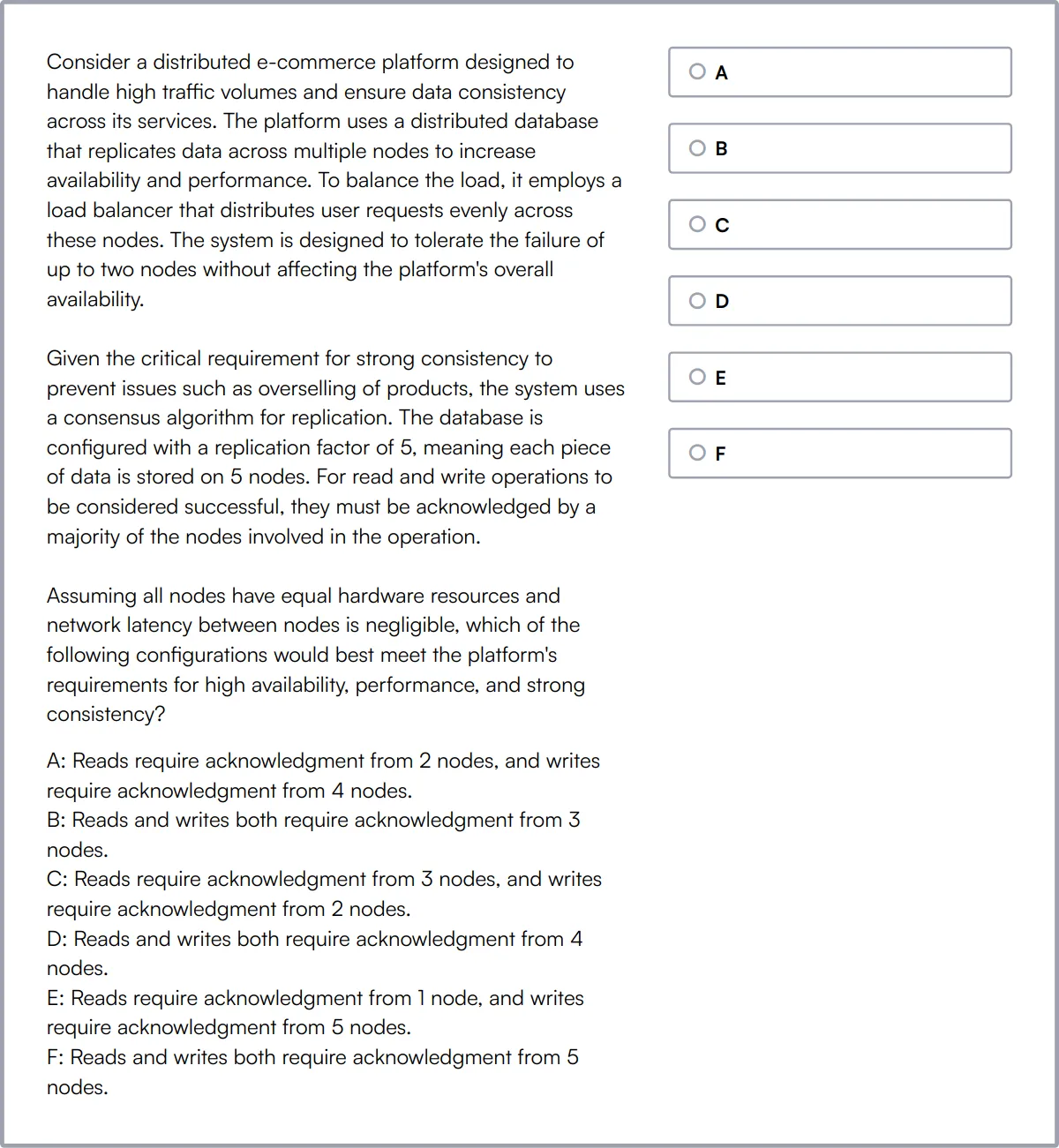
Git Online Test
The Git Online Test evaluates candidates on their understanding of Git, a popular version control system. This test covers Git basics, repository creation, branching and merging, committing changes, conflict resolution, remote repositories, rebasing, Git workflows, Git commands and concepts, and Git branching models.
The test uses scenario-based MCQs to assess knowledge of basic and advanced Git commands, the ability to resolve conflicts, and proficiency in using Git to manage source code.
Candidates who perform well on this test demonstrate a strong understanding of Git and its various functionalities. They can effectively manage source code and collaborate with team members using Git.
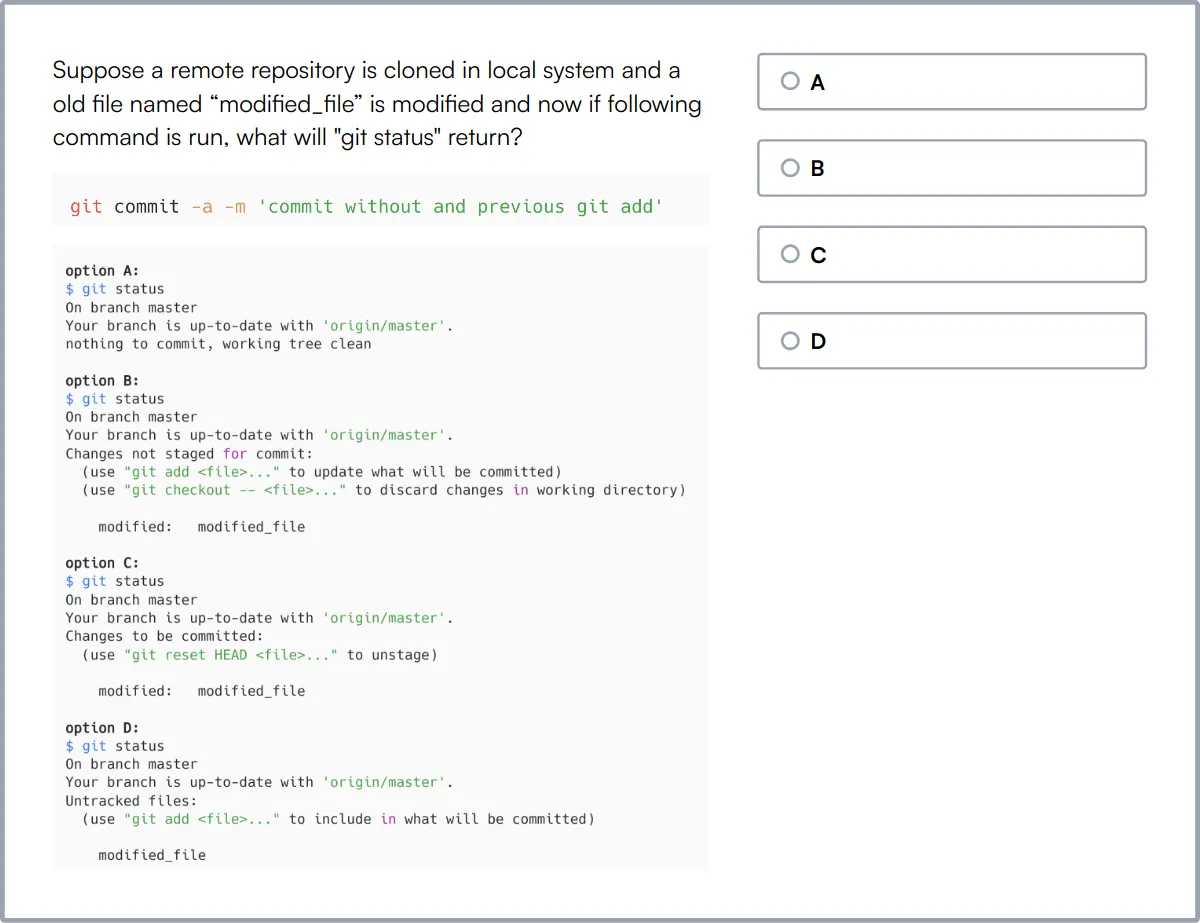
SQL Online Test
The SQL Online Test evaluates a candidate's ability to design and build relational databases and tables from scratch. This test covers creating databases, creating and deleting tables, CRUD operations, joins and subqueries, conditional expressions and procedures, views, indexes, string functions, mathematical functions, timestamps, locks, transactions, scale, and security.
The test assesses the ability to apply CRUD operations, write efficient queries and subqueries to filter data, and create efficient indexes for faster SQL queries.
Candidates who excel in this test demonstrate strong SQL skills and the ability to design and manage relational databases effectively. They show proficiency in writing complex queries and optimizing database performance.

Summary: The 9 key Software Engineer skills and how to test for them
| Software Engineer skill | How to assess them |
|---|---|
| 1. Programming Proficiency | Evaluate coding skills through problem-solving tasks. |
| 2. Algorithm Design | Assess ability to create efficient algorithms for complex problems. |
| 3. System Architecture | Review design of scalable and maintainable system structures. |
| 4. Debugging Skills | Test ability to identify and fix code issues. |
| 5. Version Control | Check proficiency in using version control systems like Git. |
| 6. Database Management | Evaluate skills in designing and managing databases. |
| 7. API Integration | Assess ability to integrate and utilize APIs effectively. |
| 8. Security Practices | Review knowledge of implementing secure coding practices. |
| 9. Testing Procedures | Evaluate skills in writing and executing test cases. |
System Design Online Test
Software Engineer skills FAQs
What are the key programming languages a software engineer should know?
Software engineers should be proficient in at least one of the following languages: Java, Python, C#, or JavaScript. Familiarity with additional languages like Go, Ruby, or Swift is also beneficial.
How can recruiters assess a candidate's skills in algorithm design?
Assessing algorithm design skills can be done through coding challenges and technical interviews that focus on problem-solving and logic. Platforms like HackerRank or LeetCode provide standardized tests.
What is important to look for in a software engineer's understanding of system architecture?
Look for experience with design patterns, knowledge of scalable systems, and familiarity with microservices or monolithic architectures. Candidates should also demonstrate an understanding of the trade-offs involved in different architectural decisions.
How do debugging skills improve a software engineer's effectiveness?
Strong debugging skills allow engineers to quickly identify and fix errors, leading to more reliable software and faster development cycles. Assess these skills through practical coding tests or discussions about past debugging challenges.
Why is version control knowledge important for software engineers?
Version control systems like Git help manage changes to the codebase, facilitate collaboration among team members, and track the history of project development. Understanding version control is critical for efficient team workflows.
What should recruiters know about API integration skills?
API integration is crucial for modern software development as it allows different systems to communicate. Evaluate candidates on their experience with RESTful services, authentication mechanisms, and how they handle data exchange.
How can knowledge of cloud platforms be a game changer for software engineers?
Knowledge of cloud platforms like AWS, Azure, or Google Cloud enables engineers to design scalable, secure, and cost-effective applications. Assess familiarity with cloud services and their practical applications in past projects.
What role does project management play in a software engineer's job?
Project management skills help software engineers plan, execute, and deliver projects successfully. Look for experience with Agile methodologies, task prioritization, and resource allocation to gauge these skills.

40 min skill tests.
No trick questions.
Accurate shortlisting.
We make it easy for you to find the best candidates in your pipeline with a 40 min skills test.
Try for freeRelated posts
Free resources



